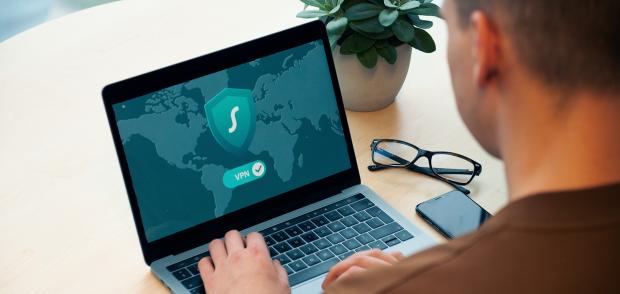Suppose you are a small business owner. In that case, you may know about the many dangers of cyber attacks and the supreme importance of solid cybersecurity for your company. Read on to learn the top five cybersecurity tips for any small business connected to the internet through an online server.
According to the US Small Business Administration, cyber attacks drain billions of dollars from the US economy annually. You will want to adhere to the following strategies to protect your small business.
1. Implement Strong Password Policies
One of the easiest and most effective measures that you can take to protect your small business is to create strong password policies to prevent unauthorized access to company IT platforms and the sensitive information they might contain. These protections have become even more critical given the many people working from home today. Strong passwords and other identification and authentication methods can stop cyber attacks via the home network and VPN (virtual private networks that use insecure networks such as public internet connections).
Password Length and Complexity
Password access systems are very effective security measures if individual passwords are sufficiently long and complex. Addressing password length, Microsoft warns against going with anything less than 12 characters and insists that “14 or more is better.” In terms of password complexity, Microsoft recommends a mixture of uppercase and lowercase letters as well as various numbers and symbols. You should refrain from using common words or names in your passwords. Furthermore, your new password choices should significantly differ from your previous ones.
Multi-Factor Authentication (MFA)
Rapidly becoming a basic necessity in cybersecurity, multi-factor authentication (MFA) goes beyond mere password entry to demand multiple types of identification or credentials to provide multiple layers of security. Beyond knowing the correct password or PIN, users may need the proper digital devices or accounts to gain access. Furthermore, they may have to pass any biometric security measures, including facial recognition, fingerprint, or retina scan.
2. Regularly Update and Patch Software
When a software company detects one or more security vulnerabilities, it generally develops one or more code patches to fix any potential problems. It then packages these patches, often with other software changes, into regular updates.
The Importance of Software Updates
Because patches address bugs and other program weaknesses that can lead to security issues, staying current on all available software updates is extremely important. You are far more resistant to viruses and other forms of cyber attacks if you do! Of course, keeping your company's cybersecurity software itself up to date is doubly important.
Automated Patch Management
With a quick look at their various instruction and support pages, you can set most applications and operating systems to update automatically. Many small businesses employ automated patch management systems to facilitate this process, ensuring the prompt download and installation of all updates across company networks and devices. In any event, it is essential to regularly update and patch all company software and systems to maintain tight cybersecurity and stay resilient against cyber attacks.

3. Educate Employees on Cybersecurity Awareness
Even the most well-meaning employees can cause a devastating data breach by unwittingly clicking on the wrong attachment. Here are just a few ways to boost the cybersecurity awareness of your employees and insulate your small business from harm:
Training on Phishing and Social Engineering
A single click can install malicious software (malware) on your company's computer systems.
Warn employees that phishing begins with social engineering. In other words, it relies upon common emotional and psychological triggers to manipulate people and get them to behave in certain ways. Phishing begins with an email or a text that looks genuine and often seems urgent. Often, these messages appear to be from a familiar person or organization.
Some phishing scams ask people to write back with sensitive information. Others encourage people to click on an attachment or link. No matter what behavior the scam encourages, those who comply will likely bring disastrous results. A single click can install malicious software (malware) on your company's computer systems. Malware can be damaging, ranging from viruses and worms to adware and spyware. It can harm and exploit your small business in a variety of ways.
Beyond generally educating employees about phishing, the US Federal Trade Commission advises business owners to institute clear policies that address this concern. In short, employees should be encouraged to thoroughly investigate the source of any message before clicking a link or sharing information. Before clicking suspicious links or sharing information, employees might need to verify their account through provided contact methods or pass the message on to an IT professional or another trusted authority.
Safe Internet and Email Practices
Phishing awareness is just one of many safe Internet and email initiatives for small businesses to implement. Furthermore, small business owners can do far more than demand multi-factor authentication and stronger passwords when protecting their internet and email systems.
Through regular educational sessions and simulated exercises, you can train employees to limit the risks of all cybersecurity threats. You can also secure strong encryption for your company wi-fi network and accentuate email security with incoming email verification technologies such as SPF (Sender Policy Framework), DKIM (DomainKeys Identified Mail), and DMARC (Domain-based Message Authentication, Reporting, and Conformance).
BYOD (Bring Your Own Device) Policies
BYOD (bring your own device) is a workplace moment that encourages employees to use their personal computing devices, including smartphones, tablets, and laptops. Such online communications reach employees at their desks or mobile devices and are more likely to be read, listened to, and acted on.
Despite its advantages, the BYOD movement has different security and data risks. Personal devices and networks may not have the same stringent protective features as company devices and networks. Wise small business owners will mitigate these risks by establishing clear company policies that govern everything from keeping personal and business accounts separate to promptly reporting problems and wiping sensitive information devices.
4. Execute Regular Data Backups
A particular type of malware that encrypts data, ransomware is commonly used to “lock” your company information after it infects your computer system. Once your information is locked away, a cyber attacker can demand an outlandish monetary ransom to return it to you. One of the best ways to protect against this attack is to execute regular data backups.
The Importance of Data Backups
If your company data is all up-to-date and stored on a backup platform, you are virtually immune to ransomware attacks. As a considerable related bonus, these backups provide the same protection against catastrophic equipment failure and other problems that threaten to wipe you clean of vital company information. Just follow the guidelines of the GCA Cybersecurity Toolkit and ensure that your backup data systems don’t remain directly connected to your main computer systems. A computer virus must be contained like a physical virus, or it is bound to spread!
Automated Backup Solutions
While data backup is far from rocket science, it can rapidly become a tedious chore. Fortunately, there are many automated backup solutions that not only do the tedious work for you but ensure you never miss a scheduled backup again.
5. Maintain Strong Network Security Measures
Among the other measures listed above, you should take the following security measures to protect your company networks.
Firewall and Antivirus Software
A firewall is an internal network security system that defends the rest of the internal network against the Internet and other untrustworthy external networks. Antivirus software detects, blocks, and removes malware from computer systems. These two critical cybersecurity arms provide bedrock protection for your small business.
Secure Wi-Fi Network
Wise small business owners will ensure their chosen Wi-Fi network is fully secure. Consider implementing Wi-Fi that meets the more stringent WPA2 or WPA3 standards of the Wi-Fi Alliance. While the most recent WPA3 standard provides the most secure connection, its encryption processes may not be supported by all existing wireless devices, according to NETGEAR Support.
Cybersecurity Best Practices and Tips
Cybersecurity for small businesses means implementing sound policies, educating employees, building a secure computer system infrastructure, and performing regular software updates and data backups. Because cybersecurity best practices are bound to change along with the rapid technological evolution, small business owners must constantly review and update security measures to stay protected.

Explore a Bachelor’s Degree in Cybersecurity
Are you ready to pursue a rewarding career while protecting small businesses and individuals against theft and exploitation? You may want to consider training through an accredited undergraduate cybersecurity program. Champlain College Online offers the opportunity to pursue your Bachelor’s Degree in Cybersecurity entirely online, from anywhere in the world, with 24/7 access to coursework. Request more information today about the Bachelor’s Degree in Cybersecurity or any other Champlain College Online program.
Request Information
Ready to take the next step? Connect with our admissions team to learn more about Champlain College Online today.

Request Information
I acknowledge that, by clicking the "submit" button, I am giving my express written consent to Champlain College and its representatives to contact me about educational opportunities via email, text, or phone, at the phone number above, including my mobile phone, using an automatic dialer, or pre-recorded message. Message and data rates may apply. I understand that my consent is not a requirement for enrollment, and I may withdraw my consent at any time.






